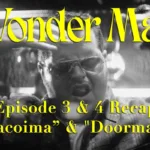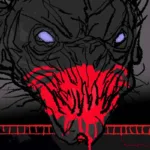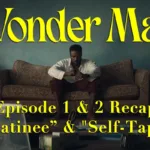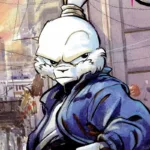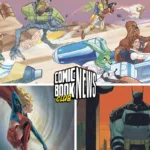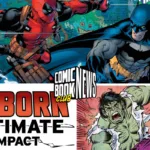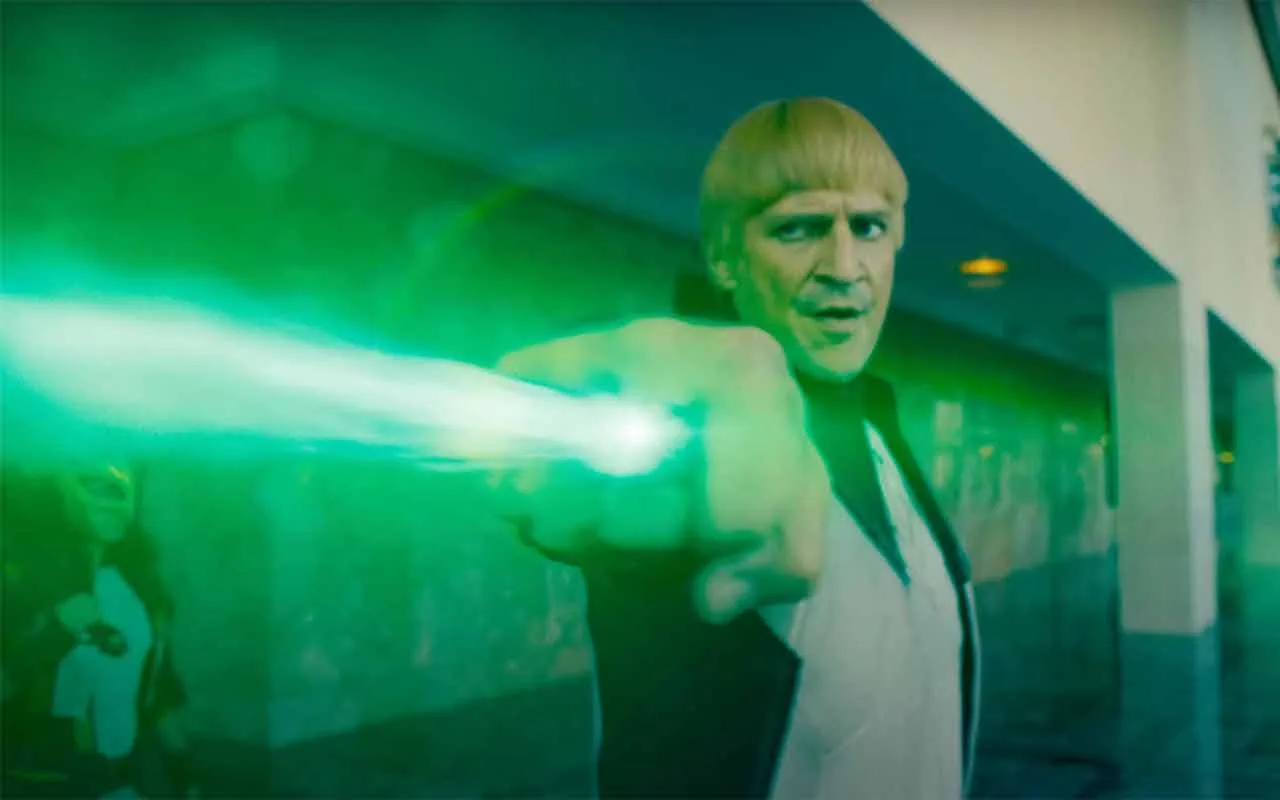Very early in the production process for the new Superman film, writer/director and studio head James Gunn told fans via Threads that his principal inspirations for the film were All-Star Superman, Superman for All Seasons, and Kingdom Come. The influences of Superman for All Seasons and All-Star Superman are easy enough to spot on screen. Star David Corenswet leans heavily on the benevolence of Jeph Loeb and Tim Sale’s Superman for All Seasons, as he contends with the lived-in universe full of wacky toys and challenges that Grant Morrison and Frank Quitely captured in All-Star.
Fans could be forgiven, however, for thinking that the only real appearance Kingdom Come makes in the film is the updated version of the “S” emblem in designer Judianna Makovsky’s 2025 version of the costume. In fact, it is Guy Gardner’s (Nathan Fillion) glowing green punch-first militarism that points a giant middle finger directly towards Kingdom Come.
Kingdom Come is a story about the perils and pitfalls of moral absolutism, and how Superman’s strict moral code comes into conflict with the quick-to-violence “tough guy” culture espoused and embodied by Fillion’s Gardner. In the new film, we see the early hints of the clash between Superman’s principled restraint, rooted in his Kansas upbringing on the Kent farm, and a new generation of heroes’ casual and enthusiastic embrace of violence. Fillion walks a fine line in his portrayal, and manages to craftily deliver a Guy Gardner who cracks jokes but demonstrates a worldview that points squarely toward the moral questions Waid and Ross asked in Kingdom Come, almost thirty years ago.
Guy’s punch-first tactics, his priestly-warrior self-image, and the authoritarian dynamics of the Justice Gang all combine to show Kingdom Come‘s clear influence on James Gunn’s Superman, and may point toward the future of the DCU.
See Kaiju, Bonk Kaiju: Violence First, Damn the Consequences
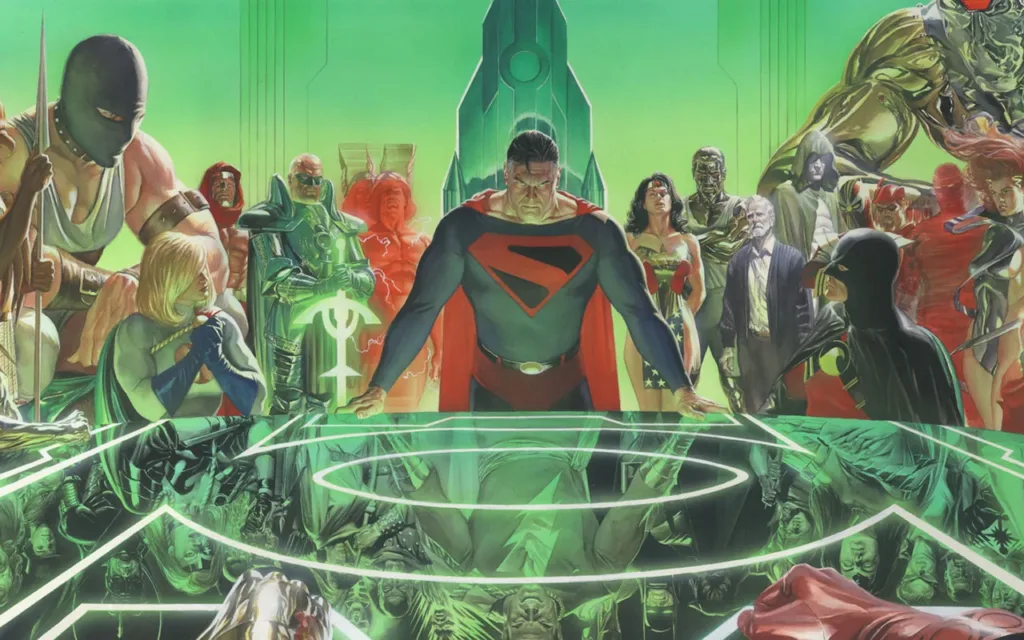
At it’s core, Kingdom Come is a story about the perils of moral absolutism and a critique of might-makes-right superheroics. In the comic, the ideal of the ends justifying the means is embodied by Magog and his Justice Battalion. That group’s lethal approach to crime-fighting leads to Superman’s self-imposed exile and the tragedy that spurs his return decades later.
Punch first, ask questions later seems to be the order of the day for the Justice Gang, comprised in the film of Mr. Terrific (Edi Gathegi), Hawkgirl (Isabela Merced), and Guy Gardner. Gardner’s use of power in the first act’s kaiju fight shows how he views his power: as a club to be used to hit the problem over and over, or as chains with which to bind the problem to his will.
Guy makes no attempt during the battle to mitigate the collateral damage. He shows no regard for the property destroyed in the fight or the civilians the Justice Gang places in jeopardy by keeping the engagement in the urban center. Guy goes in guns blazing, treating the monster like a nail and himself the biggest tool in the toolbox. This stands in stark contrast to Superman’s attempts to convince Mr. Terrific that they should try to remove the creature to a safe distance where it can be calmed and studied. Superman’s view of the world demands that he use his power to solve problems responsibly while minimizing harm. Guy and the Justice Gang want it solved by any means necessary.
While brute force may define how Guy views the use of power, his conversations with Lois Lane (Rchael Brosnahan) reveal something far more troubling: his belief that he stands above those he protects.
“We Are Also of the Cloth”: Superheroes as Warrior Priests
One of the most telling lines in the film is delivered with Nathan Fillion’s trademark smirk when he tells Lois that he and the Justice Gang are privy to Superman’s secrets because they are “of the cloth.” Lois’ immediate disbelief and the subsequent hand-wave of the line aside, it pulls back the curtain on Guy’s thinking in a manner that echoes Kingdom Come in more ways than one.
In that story, the perspective character is a human pastor named Norman McKay who has lost his faith but has been literally called to service by the Spirit of Vengeance to render judgment on humanity. The story is repeatedly cast in theological terms, with heroes framed alternately as angels and demons, depending on their alignment with Superman’s point of view. In that story, Superman does come to see himself as a member of a warrior-priest class tasked with protecting humanity but not necessarily accountable to it.
The consequences of that disassociation from his humanity are terrible in the comic. In the film, the stakes are somewhat lessened, but the question remains the same. Do Superman and, by extension, the community of superheroes, have the right to act unilaterally above and beyond the will of the nations of the world?
Following the Leader: The Authoritarian Structure of the Justice Society

The Justice Gang as a body is also a reflection of the question at the core of Kingdom Come. Guy, like the classic bully that he is, assumes that he is the leader of the Justice Gang. The group is so named because “as the leader [he has] tiebreaker.” Metamorpho (Anthony Carrigan) only receives Guy’s approval when he endorses Guy’s desire to keep the Justice Gang name.
The danger posed by this authoritarian bent is most clearly shown when Hawkgirl executes the Boravian President without trial in a blatantly extralegal killing. Guy doesn’t object. Mr. Terrific doesn’t object. No one questions the action, its impact on geopolitics, or any of the very salient questions Lois poses to Superman at the beginning of the film.
The Justice Gang’s actions call into question Superman’s repeated moral assertion from the original Kingdom Come, that “there is a right and a wrong in the universe, and the distinction is not a difficult one to make.”
It is important to remember that this version of Superman and this set of moral questions do not exist in a vacuum. They are an explicit response to the most recent version of the character on film, who also showed disregard for human life. The question of what “justice” actually means, and when, if ever, it permits the taking of life, is a bigger question than even Superman can answer in one film. The fact that Lois is the one to ask these questions at the top of the story, that the Daily Planet crew put themselves so consistently close to the danger, and that Superman himself is so clearly struggling with the question of how to apply his power, that a more direct adaptation of Kingdom Come — or at least its themes — may well be in the future of the DCU.
Where To Watch Superman:
Listen to Sons Of A Gunn:
Discover more from Comic Book Club
Subscribe to get the latest posts sent to your email.



